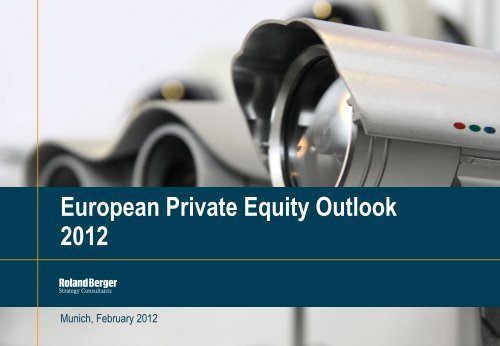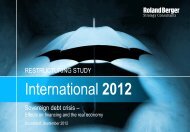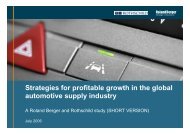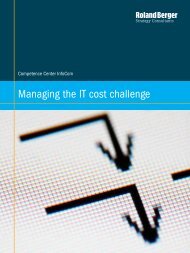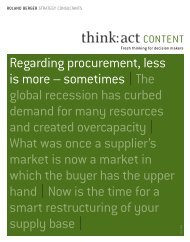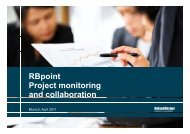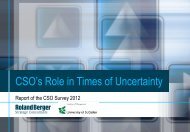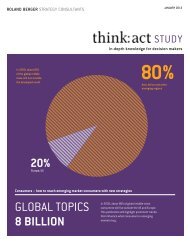European Private Equity Outlook 2012 (PDF, 1293 ... - Roland Berger
European Private Equity Outlook 2012 (PDF, 1293 ... - Roland Berger
European Private Equity Outlook 2012 (PDF, 1293 ... - Roland Berger
You also want an ePaper? Increase the reach of your titles
YUMPU automatically turns print PDFs into web optimized ePapers that Google loves.
<strong>European</strong>_<strong>Private</strong>_<strong>Equity</strong>_<strong>Outlook</strong>_<strong>2012</strong>_final.pptx<br />
<strong>European</strong> <strong>Private</strong> <strong>Equity</strong> <strong>Outlook</strong><br />
<strong>2012</strong><br />
Munich, February <strong>2012</strong>
Contents<br />
Page<br />
A. Focus of study and methodology 4<br />
B. Executive summary 6<br />
C. Results of the <strong>Private</strong> <strong>Equity</strong> survey <strong>2012</strong> 9<br />
© <strong>Roland</strong> <strong>Berger</strong> Strategy Consultants<br />
<strong>European</strong>_<strong>Private</strong>_<strong>Equity</strong>_<strong>Outlook</strong>_<strong>2012</strong>_final.pptx<br />
2
EUROPEAN PRIVATE EQUITY<br />
OUTLOOK <strong>2012</strong><br />
PRELIMINARY REMARKS<br />
Our third <strong>European</strong> <strong>Private</strong> <strong>Equity</strong> <strong>Outlook</strong> offers an interesting<br />
experts assessment of the market and its development in <strong>2012</strong><br />
The <strong>European</strong> <strong>Private</strong> <strong>Equity</strong> <strong>Outlook</strong> <strong>2012</strong> is the third <strong>Outlook</strong> that <strong>Roland</strong> <strong>Berger</strong> publishes since<br />
2009<br />
In the past the <strong>Outlook</strong> comprised analysis and assessments of selected <strong>Roland</strong> <strong>Berger</strong> and PE<br />
industry experts and experiences from <strong>Roland</strong> <strong>Berger</strong> project work<br />
With the <strong>Outlook</strong> <strong>2012</strong> we switched the approach to a study including a survey with more than 800<br />
participants from <strong>Private</strong> <strong>Equity</strong> companies all across Europe<br />
Therefore the results reflect a very live and sound picture of what the experts in the market expect<br />
for different countries, regions and relevant factors for the <strong>Private</strong> <strong>Equity</strong> business in <strong>2012</strong><br />
We hope that you enjoy studying the <strong>Outlook</strong> and are happy to take your comments or discuss the<br />
one or the other result with you<br />
Source: <strong>Roland</strong> <strong>Berger</strong><br />
<strong>European</strong>_<strong>Private</strong>_<strong>Equity</strong>_<strong>Outlook</strong>_<strong>2012</strong>_final.pptx<br />
3
A. Focus of study and methodology<br />
<strong>European</strong>_<strong>Private</strong>_<strong>Equity</strong>_<strong>Outlook</strong>_<strong>2012</strong>_final.pptx 4
The study is based on exclusive interviews with professionals of<br />
leading <strong>Private</strong> <strong>Equity</strong> firms across Europe<br />
Focus on methodology of study<br />
Overview of <strong>European</strong> <strong>Private</strong> <strong>Equity</strong><br />
Key topics <strong>2012</strong><br />
<strong>Private</strong> <strong>Equity</strong> survey <strong>2012</strong><br />
Overview of interview participants<br />
Development of PE M&A market<br />
Number of<br />
participants [#]<br />
PE experience<br />
[yrs / % of responses]<br />
Geographic focus<br />
[% of responses]<br />
DACH 1) 35%<br />
Key challenges for <strong>Private</strong> <strong>Equity</strong><br />
<strong>Private</strong> <strong>Equity</strong> business model<br />
862<br />
< 5 16%<br />
5 - 10 25%<br />
> 10 59%<br />
Europe in total 24%<br />
Poland<br />
Iberia and Italy<br />
Other CEE<br />
countries<br />
Benelux<br />
Scandinavia<br />
France<br />
UK<br />
Greece<br />
7%<br />
6%<br />
6%<br />
6%<br />
6%<br />
5%<br />
4%<br />
1%<br />
1) Germany, Austria, Switzerland<br />
Source: <strong>Roland</strong> <strong>Berger</strong><br />
<strong>European</strong>_<strong>Private</strong>_<strong>Equity</strong>_<strong>Outlook</strong>_<strong>2012</strong>_final.pptx<br />
5
B. Executive summary<br />
<strong>European</strong>_<strong>Private</strong>_<strong>Equity</strong>_<strong>Outlook</strong>_<strong>2012</strong>_final.pptx 6
<strong>European</strong>_<strong>Private</strong>_<strong>Equity</strong>_<strong>Outlook</strong>_<strong>2012</strong>_final.pptx<br />
7<br />
PE professionals are rather cautious on market development –<br />
Slowdown in most <strong>European</strong> countries expected<br />
Executive summary (1/2)<br />
Development of <strong>Private</strong> <strong>Equity</strong> M&A market in <strong>2012</strong><br />
> Respondents are generally cautious about the development of PE-driven M&A in <strong>2012</strong> – 73% expect a decline or<br />
stagnation in the number of transactions<br />
> From an industry perspective, respondents expect most M&A activity in the Pharma/Healthcare, Consumer Goods/Retail<br />
as well as the Logistics & Business services sectors<br />
> Apart from Central/Eastern Europe and Scandinavia, a sharp decline in PE M&A activity is expected – Greece (-10%),<br />
Iberia, Italy, France and Benelux (-7%) will see the sharpest declines. Moderate declines are expected in<br />
Germany (-3%) and UK (-2%) as well<br />
> Buoyancy in the capital markets and the constrained availability of debt financing render large transactions the exception;<br />
94% of all respondents expect most deals below enterprise values of EUR 250 m, 60% expect most deals below<br />
EUR 100 m<br />
> The economic outlook is considered the most relevant factor for <strong>European</strong> PE M&A in <strong>2012</strong> – A majority expects a<br />
negative development in the overall economic climate<br />
> Despite a constrained financing environment, overall market valuation levels are not expected to change – high<br />
likelihood of mismatch between buyers' and sellers' price expectations
<strong>European</strong>_<strong>Private</strong>_<strong>Equity</strong>_<strong>Outlook</strong>_<strong>2012</strong>_final.pptx<br />
8<br />
Active development of portfolio companies will be in the focus in<br />
<strong>2012</strong> – Corporate carve-outs will be a key source for targets<br />
Executive summary (2/2)<br />
Key challenges for <strong>Private</strong> <strong>Equity</strong> investors <strong>2012</strong><br />
> <strong>Private</strong> <strong>Equity</strong> investors expect to dedicate most of their time in <strong>2012</strong> to the active development of portfolio companies – New<br />
investments or exits are not in focus<br />
> The competition in fundraising is expected to become more intense in <strong>2012</strong> – Solid track record likely to be required<br />
> Corporate carve-outs are expected to be a key source for premier PE targets in <strong>2012</strong> – Due to a lack of debt financing and<br />
expected limitations in the IPO market, carve-out disposals may also prove an attractive alternative means of financing<br />
> In general, respondents do not expect distressed assets to yield attractive investment cases<br />
> Availability of debt financing, particularly for recaps and LBOs, expected to be an issue in <strong>2012</strong><br />
> Strategic investors anticipated to play an increasingly important role in PE exits – The IPO channel, however, seems to be<br />
closed for PE assets<br />
<strong>Private</strong> <strong>Equity</strong> business model<br />
> Respondents feel a need to adapt the PE business model – A third sees no need for changes<br />
> 94 % of respondents feel that a more active approach to managing companies will become more important in the future<br />
> Strategic measures for performance improvement are expected to offer the highest chances for success over the next years
C. Results of the <strong>Private</strong> <strong>Equity</strong> survey <strong>2012</strong><br />
<strong>European</strong>_<strong>Private</strong>_<strong>Equity</strong>_<strong>Outlook</strong>_<strong>2012</strong>_final.pptx 9
Source: <strong>Roland</strong> <strong>Berger</strong><br />
<strong>European</strong>_<strong>Private</strong>_<strong>Equity</strong>_<strong>Outlook</strong>_<strong>2012</strong>_final.pptx<br />
10<br />
1 DEVELOPMENT OF PE M&A MARKET<br />
PE professionals are cautious about the development of PE-driven M&A<br />
in <strong>2012</strong> – 73% of the respondents expect a decline or stagnation<br />
M&A transaction with PE involvement in <strong>2012</strong> compared to 2011 [%]<br />
Expected change in the number of M&A transactions with PE involvement<br />
in <strong>2012</strong><br />
28%<br />
73%<br />
28%<br />
17%<br />
23%<br />
4%<br />
COMMENTS<br />
> More than half of all professionals<br />
interviewed expect the number of<br />
M&A transactions with PE<br />
involvement to decrease or<br />
stagnate in <strong>2012</strong><br />
> However, there is also a significant<br />
group (one fourth of all survey<br />
participants) that anticipate a<br />
continuous increase of M&A<br />
transactions with PE involvement<br />
Less than -10%<br />
0% to -10%<br />
0%<br />
0% to +10%<br />
More than 10%<br />
% of responses [only one answer possible]
Source: <strong>Roland</strong> <strong>Berger</strong><br />
<strong>European</strong>_<strong>Private</strong>_<strong>Equity</strong>_<strong>Outlook</strong>_<strong>2012</strong>_final.pptx<br />
11<br />
1 DEVELOPMENT OF PE M&A MARKET<br />
Pharma/Healthcare and Consumer Goods/Retail sectors expected<br />
to show most M&A transactions with PE involvement in <strong>2012</strong><br />
Ranking of industries by number of M&A transactions [%]<br />
<strong>European</strong> industries with a high number of M&A transactions with PE<br />
investor involvement in <strong>2012</strong><br />
1<br />
2<br />
3<br />
4<br />
5<br />
6<br />
7<br />
8<br />
9<br />
10<br />
Pharma/Healthcare 56%<br />
Consumer Goods and Retail 51%<br />
Logistics & Business Services 37%<br />
Energy/Utilities 37%<br />
Technology & Media 34%<br />
Financial Services 27%<br />
Capital Goods & Engineering 21%<br />
Chemicals 14%<br />
Automotive 13%<br />
Building & Construction 9%<br />
% of participants that expect a high number of transactions [multiple answers possible]<br />
100% =<br />
Max. value<br />
COMMENTS<br />
> There is a clear opinion among<br />
<strong>Private</strong> <strong>Equity</strong> professionals about<br />
the industries where M&A will be a<br />
driver<br />
> More than half of all <strong>Private</strong> <strong>Equity</strong><br />
Professionals expect that<br />
Pharma/Healthcare and Consumer<br />
Goods/Retail will have a very high<br />
number of M&A transactions with<br />
<strong>Private</strong> <strong>Equity</strong> involvement
Source: <strong>Roland</strong> <strong>Berger</strong><br />
<strong>European</strong>_<strong>Private</strong>_<strong>Equity</strong>_<strong>Outlook</strong>_<strong>2012</strong>_final.pptx<br />
12<br />
1 DEVELOPMENT OF PE M&A MARKET<br />
Mid-cap segment expected to dominate – 94% of PE transactions in<br />
<strong>2012</strong> are expected in the enterprise value range of up to EUR 250 m<br />
Expected range of PE transactions in enterprise value in <strong>2012</strong>, [%, EUR m]<br />
"Most PE transactions in <strong>2012</strong> will be in the enterprise value range of…"<br />
19%<br />
94%<br />
41%<br />
34%<br />
4%<br />
2%<br />
0%<br />
COMMENTS<br />
> Large cap deals with enterprise<br />
values above EUR 500 m are likely<br />
to remain seldom<br />
> 94% of all PE transactions in <strong>2012</strong><br />
are expected to be smaller than<br />
EUR 250 m<br />
> Still 60% expect that most<br />
enterprise values of PE<br />
transactions would be even below<br />
EUR 100 m in <strong>2012</strong><br />
EUR<br />
1,000m<br />
% of responses [only one answer possible]
Source: <strong>Roland</strong> <strong>Berger</strong><br />
<strong>European</strong>_<strong>Private</strong>_<strong>Equity</strong>_<strong>Outlook</strong>_<strong>2012</strong>_final.pptx<br />
13<br />
1 DEVELOPMENT OF PE M&A MARKET<br />
Despite from Central/Eastern Europe and Scandinavia, a sharp<br />
decline in PE M&A activity is expected<br />
Change of PE M&A activity in major countries – <strong>2012</strong> vs. 2011 [%]<br />
Expected change in PE M&A activities in the following countries in <strong>2012</strong><br />
compared to 2011<br />
1<br />
2<br />
3<br />
4<br />
5<br />
6<br />
7<br />
8<br />
9<br />
10<br />
Poland 4%<br />
Scandinavia 1) 1%<br />
CEE (excl. Poland) 2) 1%<br />
UK -2%<br />
Germany -3%<br />
Austria & Switzerland -3%<br />
Benelux -7%<br />
France -7%<br />
Iberia & Italy -7%<br />
Greece -10%<br />
COMMENTS<br />
> Major PE markets like the UK and<br />
Germany are expected to see a<br />
minor slowdown of PE M&A<br />
activities – reduction of 2% to 3%<br />
in <strong>2012</strong> compared to previous year<br />
> However, in Nordic countries and<br />
Central Eastern Europe PE M&A<br />
activity is expected to gain<br />
momentum in <strong>2012</strong><br />
> Esp. Greece is expected to suffer<br />
from the uncertain economic<br />
outlook<br />
Expected change of PE M&A activity in <strong>2012</strong> compared to previous year in % [multiple answers possible]<br />
1) Includes Denmark, Norway, Sweden<br />
2) Central and Eastern Europe includes e.g. Bulgaria, Croatia, the Czech Republic, Hungary, Poland, Romania, the Slovak Republic, Slovenia
Source: <strong>Roland</strong> <strong>Berger</strong><br />
<strong>European</strong>_<strong>Private</strong>_<strong>Equity</strong>_<strong>Outlook</strong>_<strong>2012</strong>_final.pptx<br />
14<br />
1 DEVELOPMENT OF PE M&A MARKET<br />
Overall economic situation considered the most relevant factor for<br />
<strong>European</strong> PE driven M&A – Decline in economic climate expected<br />
Overview on factors with relevance for M&A business in Europe [%]<br />
"What will be the most influential factors affecting <strong>European</strong> M&A transactions<br />
with <strong>Private</strong> <strong>Equity</strong> involvement in <strong>2012</strong>? How do they develop?"<br />
1<br />
2<br />
3<br />
4<br />
5<br />
Overall economic<br />
situation<br />
Situation of the<br />
financial markets<br />
Availability of attractive<br />
acquisition targets<br />
Development of<br />
the Euro crisis<br />
Development of<br />
valuation levels<br />
Importance<br />
of factors<br />
18%<br />
12%<br />
29%<br />
25%<br />
33%<br />
Development of factors in <strong>2012</strong><br />
Substantial<br />
deterioration<br />
No<br />
change<br />
Substantial<br />
improvement<br />
COMMENTS<br />
> PE investments are mainly driven<br />
by the uncertain economic outlook<br />
of <strong>2012</strong><br />
> Survey participants anticipate a<br />
further decline of the financial<br />
markets and the overall economic<br />
situation<br />
> No change in the pipeline of<br />
attractive targets expected for<br />
<strong>2012</strong><br />
> The valuation levels are not<br />
considered to change considerably<br />
% of participants that expect high influence of this factor [multiple answers possible]
Source: <strong>Roland</strong> <strong>Berger</strong><br />
<strong>European</strong>_<strong>Private</strong>_<strong>Equity</strong>_<strong>Outlook</strong>_<strong>2012</strong>_final.pptx<br />
15<br />
1 DEVELOPMENT OF PE M&A MARKET<br />
38% of respondents expect the financing environment to be the<br />
most relevant factor for pricing of M&A deals<br />
Relevance of factors for pricing of M&A deals in <strong>2012</strong> [%]<br />
Ranking of factors: high relevance for pricing of M&A deals in <strong>2012</strong><br />
1<br />
2<br />
3<br />
4<br />
5<br />
Financing environment<br />
Target's market positioning<br />
Competition among <strong>European</strong> PE<br />
Competition from <strong>European</strong> strategic<br />
investors with <strong>European</strong> PE<br />
Historical purchase price upon entry<br />
38%<br />
25%<br />
10%<br />
8%<br />
7%<br />
COMMENTS<br />
> The current financing environment<br />
as well as the target's market<br />
position are the primary factors for<br />
determining pricing of M&A deals<br />
in 212<br />
> Competition among <strong>European</strong> PE,<br />
strategic investors – also from<br />
Asia – is not considered to be that<br />
important<br />
6<br />
Competition from Asian strategic<br />
investors with <strong>European</strong> PE<br />
7%<br />
% of participants that rank factor with high relevance [multiple answers ]
Source: <strong>Roland</strong> <strong>Berger</strong><br />
<strong>European</strong>_<strong>Private</strong>_<strong>Equity</strong>_<strong>Outlook</strong>_<strong>2012</strong>_final.pptx<br />
16<br />
2 KEY ISSUES FOR PRIVATE EQUITY <strong>2012</strong><br />
<strong>Private</strong> <strong>Equity</strong> investors will dedicate most of their time to the<br />
development of portfolio companies – Investing or exits not in focus<br />
Focus of PE investors in <strong>2012</strong> on life cycle stages [%]<br />
"On which phase of the PE value chain will you put most of your focus in<br />
<strong>2012</strong>?"<br />
40%<br />
Development of portfolio<br />
companies<br />
15%<br />
Making new<br />
investments<br />
11%<br />
Fundraising<br />
8%<br />
Divesting<br />
existing<br />
investments<br />
7%<br />
Prolongation<br />
of existing<br />
funds<br />
COMMENTS<br />
> Value creation within the holding<br />
period is a top priority for PE funds<br />
in <strong>2012</strong>; 40% of all <strong>Private</strong> <strong>Equity</strong><br />
professions will focus on the<br />
development of the existing<br />
portfolio<br />
> Only one to two out of 10 <strong>Private</strong><br />
<strong>Equity</strong> investors will continue to<br />
make new investments or will<br />
continue to raise funds or start new<br />
fundraising activities<br />
> Divesting of existing investments<br />
and prolongation of existing funds<br />
is a priority task for less than 10%<br />
% of participants that will put most of their focus on phase of PE value chain [multiple answers possible]
Source: <strong>Roland</strong> <strong>Berger</strong><br />
<strong>European</strong>_<strong>Private</strong>_<strong>Equity</strong>_<strong>Outlook</strong>_<strong>2012</strong>_final.pptx<br />
17<br />
2 KEY ISSUES FOR PRIVATE EQUITY <strong>2012</strong><br />
64% of PE professionals expect competition in fundraising to<br />
become more intense in <strong>2012</strong><br />
Expected degree of competitiveness in fundraising in <strong>2012</strong> [%]<br />
"What degree of competitiveness do you expect in fundraising in <strong>2012</strong>?"<br />
No change of<br />
competitive situation<br />
Easing up<br />
competitive situation<br />
31%<br />
5%<br />
64%<br />
Competitive situation<br />
becomes more intense<br />
COMMENTS<br />
> Two thirds of all PE professionals<br />
expect to face a more intense<br />
competitive situation for<br />
fundraising in <strong>2012</strong><br />
> Only 5%, however, see a<br />
significant improvement of the<br />
fundraising situation<br />
> One third does not see any change<br />
of fundraising in <strong>2012</strong><br />
% of responses [only one answer possible]
Source: <strong>Roland</strong> <strong>Berger</strong><br />
<strong>European</strong>_<strong>Private</strong>_<strong>Equity</strong>_<strong>Outlook</strong>_<strong>2012</strong>_final.pptx<br />
18<br />
2 KEY ISSUES FOR PRIVATE EQUITY <strong>2012</strong><br />
Carve-outs likely to be a key source for premier PE targets in <strong>2012</strong> –<br />
Distressed deals not expected to yield attractive investment cases<br />
Overview on sources of most attractive targets in <strong>2012</strong> [%]<br />
Ranking of the most important source of attractive targets in <strong>2012</strong><br />
1<br />
2<br />
3<br />
4<br />
5<br />
Parts of groups/carve-outs 76%<br />
Majority shareholdings in<br />
family-owned companies<br />
Secondary buy-outs 50%<br />
Insolvent companies/distressed deals 48%<br />
Listed companies (taking private) 21%<br />
69%<br />
COMMENTS<br />
> Carve-outs as well as majority<br />
shareholdings of family-owned<br />
companies will be the primary<br />
sources of targets in <strong>2012</strong><br />
> Secondary buy-outs and<br />
distressed deals also remain an<br />
important source for targets<br />
> Taking listed companies private is<br />
by far the least attractive source of<br />
targets for <strong>Private</strong> <strong>Equity</strong> funds<br />
% of participants that expect high importance for the source of targets [multiple answers possible]<br />
100% =<br />
Max. value
Source: <strong>Roland</strong> <strong>Berger</strong><br />
<strong>European</strong>_<strong>Private</strong>_<strong>Equity</strong>_<strong>Outlook</strong>_<strong>2012</strong>_final.pptx<br />
19<br />
2 KEY ISSUES FOR PRIVATE EQUITY <strong>2012</strong><br />
Debt financing generally expected to become more difficult in<br />
<strong>2012</strong> – Less difficulties for working capital and CAPEX lines<br />
Availability of external financing in <strong>2012</strong> [%]<br />
"Compared to 2011, what external financing will be more difficult to raise<br />
in <strong>2012</strong>?"<br />
1<br />
2<br />
Recapitalization (i.e. debt substituting<br />
equity, dividend to sponsor)<br />
Leveraged buyouts (i.e. new<br />
transactions)<br />
Easier<br />
to raise<br />
No<br />
change<br />
More difficult<br />
to raise<br />
COMMENTS<br />
> Banks are still reluctant to agree<br />
on recapitalizations and to finance<br />
leveraged buyouts<br />
> Asset-based growth financing<br />
(CAPEX, working capital) is not<br />
seen as much under pressure<br />
3<br />
Refinancing (i.e. improvement of terms)<br />
4<br />
Growth financing (i.e. working capital,<br />
lines for add-on acquisitions or CAPEX)
Source: <strong>Roland</strong> <strong>Berger</strong><br />
<strong>European</strong>_<strong>Private</strong>_<strong>Equity</strong>_<strong>Outlook</strong>_<strong>2012</strong>_final.pptx<br />
20<br />
2 KEY ISSUES FOR PRIVATE EQUITY <strong>2012</strong><br />
Strategic investors are anticipated to play an increasingly important<br />
role in PE exits – IPO channel expected to be closed for PE assets<br />
Change of exit channels in <strong>2012</strong> compared to 2011 [%]<br />
Ranking of exit channel activity: expected significant increase in <strong>2012</strong><br />
compared to previous year<br />
1<br />
2<br />
3<br />
4<br />
5<br />
M&A with strategic investors 61%<br />
M&A with PE investors 27%<br />
Triple track<br />
(i.e. IPO, M&A process and refinancing)<br />
Dual track<br />
(i.e. IPO and M&A process)<br />
IPO 2%<br />
11%<br />
10%<br />
COMMENTS<br />
> Strategic investors represent<br />
strong competition in PE auction<br />
processes based on additional<br />
synergy levers – A significant<br />
increase of exits with strategic<br />
investors is expected in <strong>2012</strong><br />
> Secondary buy-outs remain an<br />
option while<br />
> Dual and triple track are<br />
considered while the IPO channel<br />
is expected to be closed for PE<br />
assets<br />
% of participants that expect a significant increase of exit channel [multiple answers possible]<br />
100% =<br />
Max. value
Source: <strong>Roland</strong> <strong>Berger</strong><br />
<strong>European</strong>_<strong>Private</strong>_<strong>Equity</strong>_<strong>Outlook</strong>_<strong>2012</strong>_final.pptx<br />
21<br />
3 PRIVATE EQUITY BUSINESS MODEL<br />
The majority of respondents feel a need to adapt the PE business<br />
model – 36% see no need for changes<br />
Adjustment of <strong>Private</strong> <strong>Equity</strong> business model necessary [%]<br />
"The <strong>Private</strong> <strong>Equity</strong> business model is just as robust now as it was before<br />
the crisis. No adjustment is necessary. Agree or disagree?"<br />
Disagree Neutral Agree<br />
Completely<br />
disagree<br />
21%<br />
Completely<br />
agree<br />
19%<br />
COMMENTS<br />
> More than half of the PE<br />
professionals think that the <strong>Private</strong><br />
<strong>Equity</strong> business model needs to be<br />
changed<br />
> Still one third – however – expects<br />
no need to change the investment<br />
strategies in place<br />
79%<br />
Somewhat disagree<br />
Neither agree<br />
or disagree<br />
81%<br />
Somewhat agree<br />
57% of all participants 7% of all participants 36% of all participants
Source: <strong>Roland</strong> <strong>Berger</strong><br />
<strong>European</strong>_<strong>Private</strong>_<strong>Equity</strong>_<strong>Outlook</strong>_<strong>2012</strong>_final.pptx<br />
22<br />
3 PRIVATE EQUITY BUSINESS MODEL<br />
94 % of respondents feel that a more active approach to managing<br />
companies will become more important in the future<br />
Importance of active portfolio management [%]<br />
"Managing portfolio companies actively will become more important in the<br />
future – Passive management is no longer suitable. Agree or disagree?"<br />
4% 94%<br />
74%<br />
COMMENTS<br />
> Stronger focus on proactive<br />
operational improvement within the<br />
portfolio companies becomes more<br />
important<br />
> Passive portfolio management with<br />
pure financial engineering is<br />
limited<br />
20%<br />
2%<br />
2%<br />
2%<br />
Completely<br />
disagree<br />
Somewhat<br />
disagree<br />
Neither agree<br />
nor disagree<br />
Somewhat agree<br />
Completely agree<br />
% of responses [only one answer possible]
Source: <strong>Roland</strong> <strong>Berger</strong><br />
<strong>European</strong>_<strong>Private</strong>_<strong>Equity</strong>_<strong>Outlook</strong>_<strong>2012</strong>_final.pptx<br />
23<br />
3 PRIVATE EQUITY BUSINESS MODEL<br />
Strategic measures for performance improvement are expected to<br />
offer the highest chances for success in the next years<br />
Chances of success of value-enhancement measures [%]<br />
Ranking of value enhancement measures for PE portfolio companies<br />
according to chances for success in the next years<br />
1<br />
2<br />
3<br />
Strategic measures<br />
(e.g. buy-and-build)<br />
Operational measures<br />
(e.g. cost cutting,<br />
outsourcing)<br />
Financial measures<br />
(e.g. recapitalisation,<br />
refinancing)<br />
2%<br />
34%<br />
54%<br />
COMMENTS<br />
> The implementation of strategic<br />
measures offers the best chances<br />
for success in the next year<br />
> Continuous operational measures<br />
like cost cutting and outsourcing<br />
can tap additional potential to<br />
improve profitability<br />
> The effect of financial measures in<br />
terms of value enhancement is<br />
very limited<br />
% of responses that expect very promising chance of success for value enhancement measures<br />
[multiple answers possible]<br />
100% =<br />
Max. value
<strong>European</strong>_<strong>Private</strong>_<strong>Equity</strong>_<strong>Outlook</strong>_<strong>2012</strong>_final.pptx<br />
24<br />
It's It's character<br />
that character creates<br />
impact! that creates<br />
impact!


